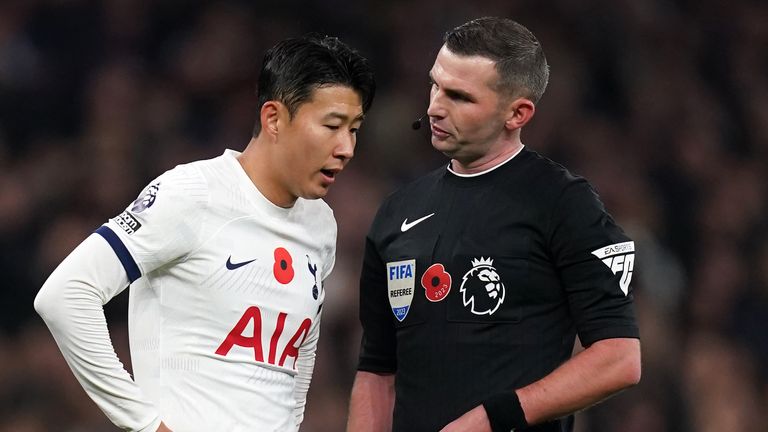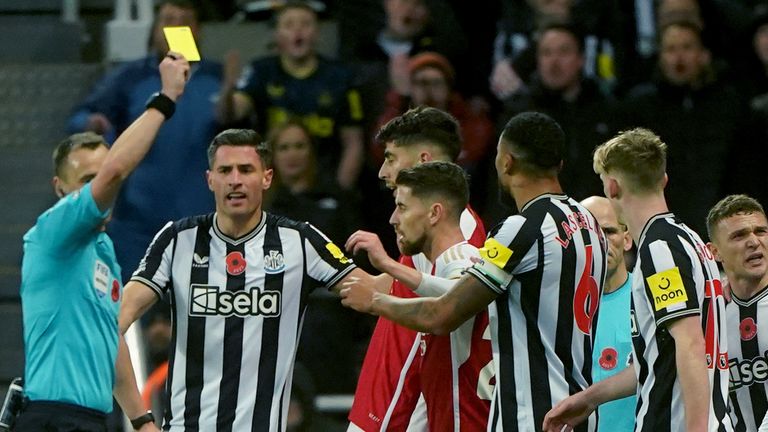Sin bins to be trialled in professional football as part of new IFAB law proposals
Measures to improve player behaviour and increase respect for match officials were supported at the law-making International Football Association Board (IFAB) annual meeting on Tuesday.
A proposed trial whereby only the team captain may approach the referee in certain game situations was backed and it was also agreed that temporary dismissals for dissent and specific tactical offences should be trialled at higher levels.
Sin bins have already had a successful implementation in grassroots football.
The sin bin was introduced to rugby union in 2001, where there has also long been a rule which means only the captain can approach the referee, and there is rarely any issue with players surrounding referees.
The proposals will be considered at IFAB’s AGM in March and any changes approved will be incorporated into the Laws of the Game from July 1, 2024.
The members also agreed on continuing to develop semi-automated offside technology to help on-field match officials speed up decision making.
The meeting discussed strategies to address the time lost in games and tactics aimed at disrupting the tempo, including the six-second time restriction for goalkeepers to release the ball, delaying restarts and managing injuries.
IFAB also agreed that, after the successful VAR decision communication trial conducted by football’s world governing body FIFA, in which the referee announces the final decision after a VAR review, the AGM should consider including this measure.
The members were updated on the ongoing FIFA-led review of the video assistant referee (VAR) protocol, which aims to identify whether any formal recommendations are required for amendments or trials.
This process will involve discussions with major football competitions that have extensive experience of using the VAR system, and all members agreed that any measures should not result in any additional delays.
The meeting considered potential clarifications for the Laws of the Game 2024-25, including a possible amendment to Law 12 (Fouls and Misconduct), according to which handball offences leading to penalties would be sanctioned in the same way as fouls.
The members were also updated on the successful trial involving match officials wearing body cameras at grassroots level, which had been introduced to deter instances of serious misconduct towards match officials.
What IFAB discussed at the ABM

The ABM discussed potential strategies to address time-wasting tactics, including the six-second restriction for goalkeepers, delaying restarts and managing injuries. The members agreed any new VAR measures should not result in any additional delays.
It also considered potential clarifications for next season’s laws, including a possible amendment to Law 12 (Fouls and Misconduct), in which handball offences for penalties would be sanctioned in the same way as fouls.
The ABM agreed on continuing to develop semi-automated offside technology to assist on-field match officials to speed up offside decisions.
It was also agreed that, after the VAR decision communication trial conducted by FIFA, in which the referee announces the final decision after a VAR review, the ABM should consider including this effective measure in the laws of the game.
The members were also updated on the successful trial involving match officials wearing body cameras at grassroots level, which was introduced to deter serious misconduct incidents towards officials.
‘Sin bins have worked very, very well in the grassroots of the game’
Tuesday’s meeting in London will shape the agenda for the organisation’s annual general meeting, which will be held on March 2 in Glasgow, where any proposed changes to the laws of the game will be considered for approval. Protocols and a system for trialling will now be developed.
Board member Mark Bullingham, the chief executive of the Football Association, said: “When we were looking at sin bins – protocol clearly has to be developed – the areas we were looking at were dissent, where it’s worked very, very well in the grassroots game in England.
“We’ve also spoken about other areas, particularly tactical fouls.
“I think frustration for fans watching games when they see a promising counter-attack that’s ruined by that and the question of whether a yellow card is sufficient for that has led to us looking at whether that should be involved in the protocol as well.
“The starting point was looking at player behaviour and dissent – we’re then looking at whether we should extend it into other areas, such as tactical fouls, as well.”
Merson Says: Sin bins would kill the Premier League
Sky Sports’ Paul Merson:
“You put someone in the sin bin in football for 10 minutes, you’re killing the game. You’d get 10 players sitting behind the ball the whole time, it’d be the most boring football ever. It’s an absolute waste of time, a waste of time.
“Everybody loves the Premier League, you have a shot at one end and there’s a corner up the other end 30 seconds later. That just goes out the window for this 10 minutes, the team with the man down have got no choice but to sit behind the ball.
“All they’d be doing then for that 10 minutes is taking their time over taking a throw-in, they’ll take a goal kick, they’ll buy a foul, and it’ll just grind out the worst 10 minutes you could imagine.
“You’re playing in the biggest league in the world, there’s going to be emotions, they get high – that’s the way it is. You’re playing to win, everybody wants to win. The thing they need to really get rid of is cheating.”
IFAB keen to improve player behaviour

IFAB secretary Lukas Brud spoke exclusively to Sky Sports as part of our Future of Football series in the summer and explained player behaviour was one of three of the main topics on IFAB’s agenda for the future along with technology and player welfare.
“One of the main topics we are looking into at the moment is improved participant behaviour on and around the field of play,” Brud told Sky Sports back in July. “We want to find a way to improve the behaviour of all participants because of the retention of referees, and motivating referees to participate in the game and become referees is decreasing.
“We need to find a way of making sure there are enough referees, that they are being respected and that they can work properly on the field of play.”
Player behaviour was a theme throughout last season with 15 of the 20 Premier League clubs fined at least once for failing to control their players.
Brud went on to explain the sin bin was on of the ideas that could help with player behaviour.
“There are a number of ideas on the table in relation to player behaviour,” he said. “The sin bin is certainly one of them.
“We are going to create a working group at IFAB, with different stakeholders in the game, to see what kind of ideas could be introduced into the game or trialled at least.
“The temporary dismissal is certainly one of them because it is already being applied at some lower levels of the game. But whether it might be trialled at the top level of the game or not, this is something we will be discussing over the next couple of years.”
‘Something we could see in football in next couple of years’
Sky Sports News chief news reporter Kaveh Solhekol:
“The meeting that took place at Heathrow was focused on player behaviour.
“What we are going to see in the future is more trials of having sin bins in football.
“In certain situations, like dissent, if a player is rude to a referee the referee can send him to the sin bin for say 10 minutes.
“Also, in other situations, like tactical fouls, the referee would have the power to send the player to the sin bin.
“What is also going to be trialled more is something they have in rugby union where in certain situations only a team captain is allowed to approach and speak to the referee.
“IFAB are very concerned about player behaviour and also the behaviour of managers as well. They think trialling the captain being the only person allowed to talk to the referee could cut down on dissent and bad behaviour.
“There has already been trials of sin-bins at grass-roots level. I think we will see more trials at amateur level and also competitions and leagues are going to be able to have these trials and take part in them, if we want.
“I think this is really something we could see in football over the next year or two because the behaviour of players and manager towards referees is something the lawmakers of the game are really concerned about. It affects the way people at grass roots football interact and treat referees.
“We’ve seen a real problem with trying to get people into refereeing because they don’t want the hassle. They don’t want to be shouted at and abused, and in rare cases physically attacked, at all levels of football.”
Credit: Source link